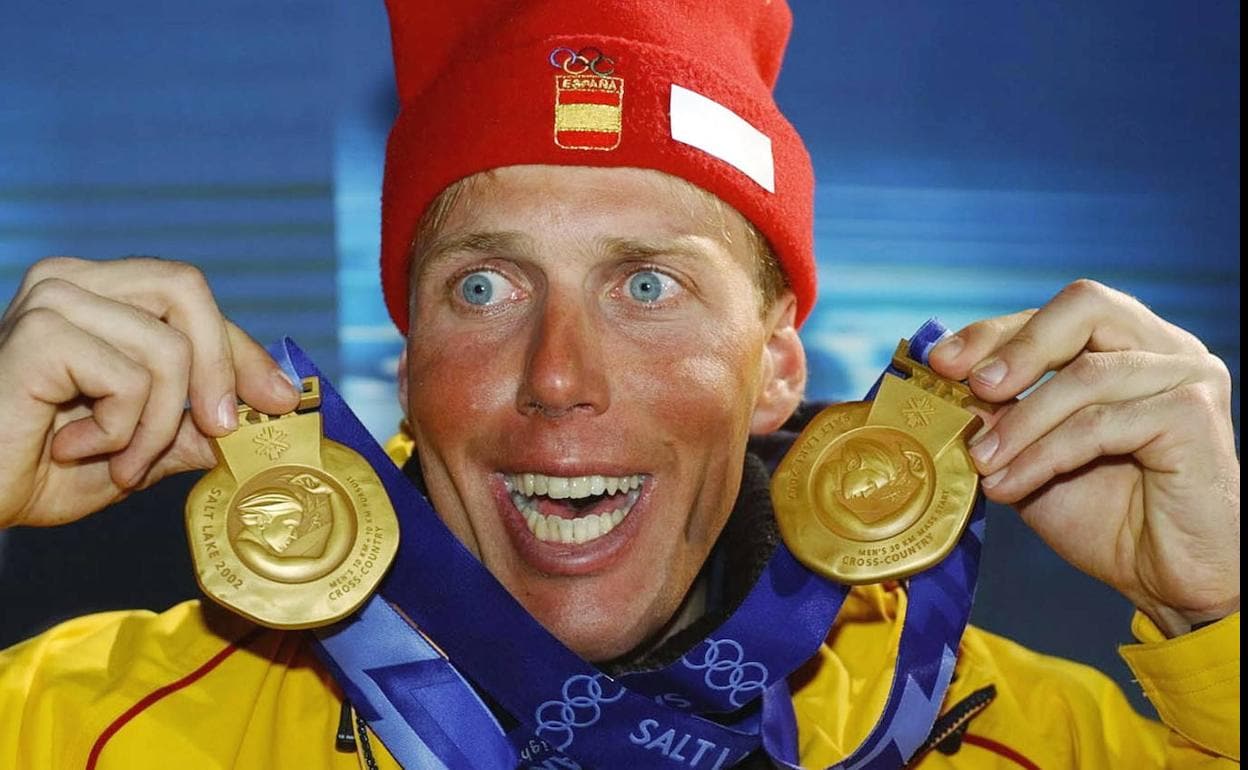Spain's two winter golds - one historical, the other a scandal
'Paquito' and 'Juanito' starred in two golden stories for Team Spain at previous Winter Olympics: the former became the first Spanish Winter Olympic champion; the latter became a cause of embarrassment
ALEKK M. SAANDERS
Monday, 14 February 2022, 19:20
Fifty years ago, at the 1972 Winter Olympics in Sapporo, 21-year-old Francisco 'Paquito' Fernández Ochoa from Madrid won an Olympic gold medal in the slalom, being the first Spanish Winter Olympic champion.
Thirty years later, 32-year-old German-born Johann Mühlegg won three gold medals in cross-country skiing for Spain, but was later stripped of his titles for doping offences.
Changing passports to compete for another country has long been common practice among athletes, especially over recent decades. Among others, Britain is known for recruiting in its Olympic team a large number of foreign-born athletes. For these 2022 Olympic Games, China has been 'active' in naturalising foreigners for its team.
Spain has also been known to hand out citizenships to improve its Olympic prospects. This year in Beijing Olivia Smart, who obtained Spanish nationality in 2017, is trying to raise Spain's profile on the international winter sports scene.
Twenty years ago, Spain looked set to chalk up a triple gold by recruiting German-born Johann Mühlegg, but his apparent success turned into embarrassment for his adopted country.

Fifty years ago, at the 1972 Winter Olympics in Sapporo, 21-year-old Francisco 'Paquito' Fernández Ochoa from Madrid won an Olympic gold medal in the slalom thus being the first Spanish Winter Olympic champion
Johann from Bavaria
Johann Mühlegg was born on 8 November 1970 in Bavaria, West Germany. When he was 12, he started cross-country skiing, and seven years later he was already world junior champion in the 30km event. Under the German flag Johann took part in three Olympic Games: in Albertville 1992, in Lillehammer 1994, and in Nagano 1998, though he never won a medal.
It is thought his poor results and frequent conflicts destroyed the skier's relations with the German ski federation. At one point Mühlegg even accused the German head coach of "damaging him spiritually". In 1995, he was thrown off the team, but was reinstated later. Nevertheless, it is believed that he still felt uncomfortable in his team, and didn't trust anybody. Finally, after the 1998 Nagano Games the skier was ejected again from Team Germany.
'Juanito' for Spain
Fortunately, having good relations with members of the Spanish cross-country skiing team, Mühlegg easily established a relationship with the Royal Spanish Winter Sports Federation (RFEDI). In order to continue competing at a professional level, he applied for Spanish nationality, which was granted in November 1999. In the same year, Johann Mühlegg competed for Spain, and won the country's first World Cup race.
Then, representing Spain, at the 2001 Nordic World Ski Championships, Johann won another two gold medals. After those victories, the skier became Spain's main hope for a medal at the 2002 Winter Olympics in Salt Lake City.
Johan's triumphs sparked Spanish interest in winter sports and the German, or rather 'new' Spanish citizen, was affectionately nicknamed 'Juanito' by both friends and the sports media.
The biggest fraud
In the 2002 Games, Mühlegg won gold medals in the 30km freestyle and the 10km + 10km pursuit races. These were the first Olympic medals for Spain in cross country skiing. With his second gold medal Johann Mühlegg went down in the history of Spanish Olympics by becoming the first athlete to win two first places at the same Games.
King Juan Carlos I personally congratulated him for his successful contribution to Spanish sport. He went on to win the 50km race, but after that it was announced that a previous doping control had detected the presence of a banned substance.
Johann Mühlegg was immediately disqualified and expelled from the Games. Subsequently, his case was taken to the Court of Arbitration for Sport (CAS). Later the Spanish skier was banned for two years and lost the three golds he won in Salt Lake City.
In the 2002 Winter Olympics, with his second gold medal, Johann Mühlegg went down in the history of Spanish Olympics by becoming the first athlete to win two first places at the same Games
It is said that Mühlegg's sanction made the Spanish authorities aware of the need to fight doping. Until then, Spain was considered one of those countries which, with the excuse of the good weather, allowed foreign athletes to train without asking too many questions about using prohibited methods. It was stressed that Mühlegg always demanded to train outside the group, and without federation supervision.
When Johann Mühlegg had served his ban, he applied to rejoin Team Spain to participate in the 2006 Turin Games. It appears he did not feel supported by the Spanish federation, and eventually retired from both professional sport and public life
Hotelier in Brazil
Spanish newspapers chastised the previously loved and admired 'Juanito'. One of them wrote: “It is difficult for someone to go from being a Spanish hero to being a German disgrace in less than 24 hours.”
However, when Johann Mühlegg had served his ban, he applied to rejoin Team Spain to participate in the 2006 Turin Games. It appears he did not feel supported by the Spanish federation, and eventually retired from both professional sport and public life.
Later he was to exchange Spain for Brazil, where the former top level cross-country skier established his hotel business. They say he sometimes goes to Germany to teach skiing and visit his family.
